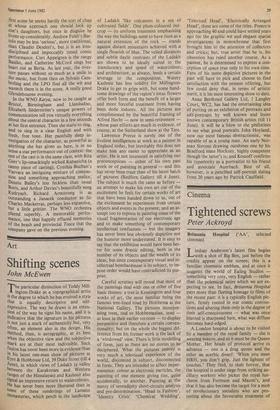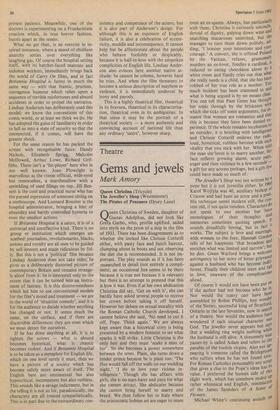Cinema
Tightened screws
Peter Ackroyd
Britannia Hospital ('AA', selected cinemas)
T indsay Anderson's latest film begins L./with a shot of Big Ben, just before the credits appear on the screen; this is a familiar cinematic emblem, and at once it suggests the world of Ealing Studios something very cosy, very English — rather than the polemical satire which we are ex- pecting to see. In fact, Britannia Hospital pays more than fleeting homage to films of the recent past: it is a typically English pic- ture, firmly rooted in our comic conven- tions and altering them only in the degree of their self-consciousness — what was once blurred is sharpened here, what was diffuse becomes hard-edged.
A London hospital is about to be visited by a member of the royal family — she is wearing mauve, and so it must be the Queen Mother. Her heads of protocol arrive in advance — one is a drag queen and the other an acerbic dwarf: 'When you meet HRH, you don't grip. Just the lightest of touches.' They find, to their horror, that the hospital is under siege from striking an- cillary workers who picket the royal lun- cheon from Fortnum and Mason's, and that it has also become the target for a mob of revolutionary socialists who are pro- testing about the favourable treatment of
private patients. Meanwhile, one of the doctors is experimenting on a Frankenstein creation which, in true horror fashion, bursts apart at the seams.
What we get then, is an exercise in in- spired nonsense, where a mood of ebullient anarchy settles over everything like laughing gas. Of course the hospital setting itself, with its hatchet-faced matrons and indolent workers, immediately brings back the world of Carry On films, and in fact Britannia Hospital is funny in much the same way — with that frantic, prurient, outrageous humour which relies upon a sequence of terrible misfortunes and absurd accidents in order to propel the narrative. Lindsay Anderson has deliberately used this model: we know the conventions of this comic world, or at least we think we do. He has adopted the guise of familiarity in order to lull us into a state of security so that the unexpected, if it comes, will have the greater shock.
For the same reason he has packed the screen with recognisable faces: Dandy Nichols, Elizabeth Sprigg, Malcolm McDowell, Arthur Lowe, Richard Grif- fiths. There isn't a 'bit-player' here who is, not well known. Joan Plowright is marvellous as the COHSE official, wide-eyed but remorseless, a marshmallow with a sprinkling of steel filings on top. Jill Ben- nett is the cool and practical nurse who has the pursed expression of someone sitting on a stethoscope. And Leonard Rossiter is the hospital administrator, bringing a hint of absurdity and barely controlled hysteria to even the smallest actions.
If Britannia' Hospital is a satire, it is of a universal and unreflective kind. There is no group or institution which emerges un- scathed: journalists, revolutionaries, blacks, unions and royalty are all seen to be guided by self-interest and made ridiculous by fol- ly. But this is not a `political' film because Lindsay Anderson does not take sides; he gives us a deliberately distorted picture of contemporary Britain and remains strange- ly aloof from it: he is interested only to the extent that it can be turned into an instru- ment of fantasy. It is this disinterestedness which led him to use conventional models for the film's mood and treatment — we are in the world of `situation comedy', and it is for the audience to decide whether anything has changed or not. It seems much the same, on the surface, and if there are discernible differences they are ones which we must detect for ourselves.
If he has done anything at all, it is to tighten the screws — what is absurd .becomes hysterical, what is chaotic becomes violent. And if Britannia Hospital is to be taken as a metaphor for English life, which on one level surely it must, then we have a picture of a society which has become subtly more aware of itself. The English here are sentimental but also hypocritical, incompetent but also ruthless. This sounds like a savage indictment, but in the telling it is not so for, paradoxically, the characters are all treated sympathetically. This is in part due to the extraordinary con-
sistency and competence of the actors, but it is also part of Anderson's design. For although this is an exposure of English failure, it is also a celebration of eccent- ricity, muddle and inconsequence. It cannot help but be affectionate about the people who behave foolishly or despicably, because it is half-in-love with the unspoken complicities of English life. Lindsay Ander- son also evinces here another native at- titude: he cannot be solemn, however hard he tries. And when the film threatens to become a serious description of mayhem or violence, it is immediately undercut by irony and parody.
This is a highly theatrical film, theatrical in its bravura, theatrical in its characterisa- tion, theatrical even in its ambiguities. In that sense it may be the portrait of a theatrical society — a more authentic and convincing account of national life than any ordinary 'satire', however sharp.







































 Previous page
Previous page